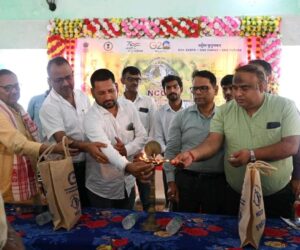Agriculture
Agriculture is not just an occupation in Bihar—it is a way of life. With over 70% of the state’s population dependent on farming, the fields of Bihar tell a story of resilience, tradition, and the promise of transformation. Yet, for all its potential, the sector faces deep-rooted challenges that require modern solutions.
Seasons & Soil: The Foundation of Bihar’s Farming
Bihar’s agriculture is shaped by three distinct crop seasons:
Kharif (June–October) – Driven by the monsoon, this season sees paddy, maize, and pulses as the dominant crops.
Rabi (November–March) – Wheat, lentils, chickpeas, and mustard thrive under cooler temperatures.
Zaid (April–June) – Short-season crops like cucumbers, melons, and green gram are cultivated between Rabi harvest and Kharif sowing.
The state’s soils are as diverse as its landscapes:
Alluvial Soil – Found in North Bihar, rich and fertile, ideal for paddy and wheat.
Red & Lateritic Soil – In parts of South Bihar, suited for pulses and oilseeds.
Sandy Loam Soil – Supports vegetables and maize, especially in riverine areas.
Major Crops of Bihar
Cereals – Rice, wheat, maize.
Pulses – Lentils (masoor), pigeon pea (arhar), green gram (moong).
Cash Crops – Sugarcane, jute, and tobacco in certain belts.
Horticulture – Litchi (Muzaffarpur), mango (Bhagalpur), banana, and vegetables.
Challenges Facing Bihar’s Farmers
Despite rich natural resources, several issues continue to limit agricultural growth:
Floods & Droughts – North Bihar frequently faces floods from Himalayan rivers, while South Bihar battles recurring droughts.
Fragmented Land Holdings – Small plots make mechanization and high-yield practices difficult.
Low Irrigation Coverage – Heavy dependence on erratic monsoons.
Poor Market Linkages – Farmers often sell produce at low prices due to lack of storage and organized markets.
Post-Harvest Losses – Lack of cold storage and processing units leads to wastage, especially in vegetables and fruits.
Limited Access to Modern Technology – Traditional practices dominate due to low awareness and financial constraints.
Solutions & Pathways Forward
Experts recommend a multi-pronged approach:
Flood-Resilient & Drought-Resistant Varieties – Developing crops that survive extreme weather.
Expansion of Irrigation Infrastructure – Solar pumps, drip irrigation, and community water management.
Agri-Mechanization – Affordable, small-scale machines for small farmers.
Value Addition & Processing – Encouraging food processing units to reduce wastage.
Farmer Producer Organizations (FPOs) – For collective bargaining and better market access.
Agri-Training & Digital Platforms – To spread awareness of best practices and real-time market trends.
The Role of Gramshree Kisan School
In the heart of Bihar’s agricultural transformation is Gramshree Kisan School, jointly promoted by Scope Training and Consulting Pvt. Ltd. and Gramshree Agri Services Pvt. Ltd., a renowned agri-based startup incubated by ICAR-IARI Pusa, NAARM, and CIMP-BIIF.
What Gramshree Kisan School Does:
Training – Equips farmers with modern techniques in crop cultivation, pest management, and irrigation.
Trading Support – Helps farmers connect directly with buyers, improving income.
Treatment Services – Provides soil testing, crop health diagnostics, and organic pest solutions.
Technology Transfer – Demonstrates practical use of drones, precision farming tools, and biofertilizers.
Through its programs, Gramshree Kisan School is bridging the gap between traditional knowledge and modern agronomy—ensuring Bihar’s farmers are ready for both local challenges and global opportunities.
Conclusion
Bihar’s fertile fields hold immense promise, but their future depends on adapting to climate change, modernizing practices, and building resilient market linkages. With organizations like Gramshree Kisan School leading farmer empowerment, the vision of a prosperous, self-reliant rural Bihar is no longer a distant dream—it’s a growing reality.
- Accountability or the lack of it: Being accountable has been defined as the procedures and processes by which one party justifies and takes responsibility for its activities.





